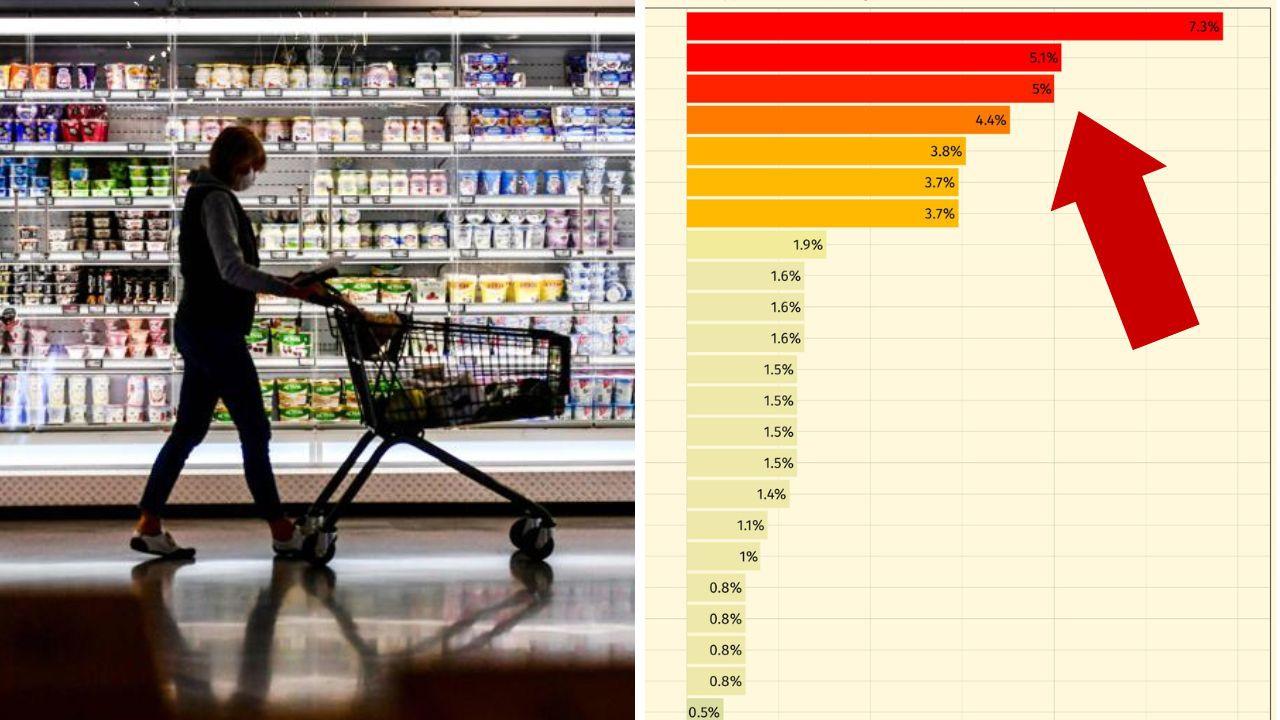There’s a place that gives me the shivers: And not just because it’s cold. The fresh section of the supermarket has become terrifying.
I’m not frightened of the vegetables themselves. What’s different is the numbers on the price tags. They suddenly make vegetables look like luxury goods.
The latest consumer price inflation figures are out and they tell a shocking story.
As the next chart shows, the price of vegetables has gone supernova. It’s hardly the only product to have shot up. Your breakfast cereal and the sandwich in your lunch box are also much more expensive than before. Only one product category fell in price in the most recent data: pork.
The price of vegetables went up a lot between March and June this year because in winter, we get our veg from Queensland, and the state got flooded in March. Fields that would usually be full of happy young lettuces were instead knee-deep in filthy floodwater.
The basic law of economics says when things are in short supply, the market starts raising prices. Only buyers who really want something – and who can afford it – are left buying. The rest of us stop buying. This is what markets do – change prices to make sure demand equals supply. Sometimes that means raising prices a lot to scare off most buyers.
I was definitely put off buying my favorite fresh vegetables by high prices. I bought frozen veg a few times, and even bought brussels sprouts instead of broccoli at one point – talk about desperate times!
The price of fruit
Fruit was up by a lot in the three month period too. It rose 3.7 per cent, which is significant. Berry crops got hit by bad weather too. But fruit inflation would have been a lot higher if it wasn’t for avocados. Those guys have their seed on the inside, so they count as fruit, and they have tumbled in price. Who among us hasn’t shoveled in a lot of guacamole in recent times?
Avocado farmers seem to have gone on a planting spree back when jokes about smashed avo were at their peak. It takes five years or so for an avocado tree to grow enough to make fruit, and now the farmers are pulling in massive crops. Jokes about smashed avocado are over in 2022 however, and in a grim irony, it’s avocado prices that are now toast.
“The additional [avocado] trees started producing fruit around the middle of last year, leading to oversupply and sharp price falls,” said a spokesperson from the ABS when I asked about why fruit prices were not as high as vegetables.
She explained avocados are often eaten in cafes and restaurants, so when we eat at home more the avocado industry takes an extra hit.
“Reduced demand from the food service industry due to lockdowns also reduced demand for avocados during the later parts of last year,” she said.
That adds up to cheap avocados. I bought a bagful yesterday for well under a dollar each.
Pork on your fork
The outlier in the graph above is pork. Why is it cheaper, I asked? The answer seems to be cheap imports. I went digging for data and found the Australian pork industry published loads of information on pork imports. They say that by May 2022 we had brought in a lot more pork – 22,000 tonnes instead of 13,000 tonnes by May 2021. Our extra bacon is especially coming from Denmark and the Netherlands.
That extra supply has helped eased prices after a period early in 2022 where pork prices got a lot higher.
But why are the Europeans suddenly sending us so much pork? The answer is a fascinating one – pigs don’t graze grass like cows – you have to feed them (not unlike people!) and as the next chart shows, the cost of feed as a percentage of the eventual price of the pig got very high in early 2022.
Pig farmers have the choice to either make money by turning pigs into bacon, or spend money keeping on feeding them. They are choosing the former. So ironically, high food prices in Europe may be helping keep down the price of Australian pork.
Jason Murphy is an economist | @jasemurphy. He is the author of the book Incentivology.
.
